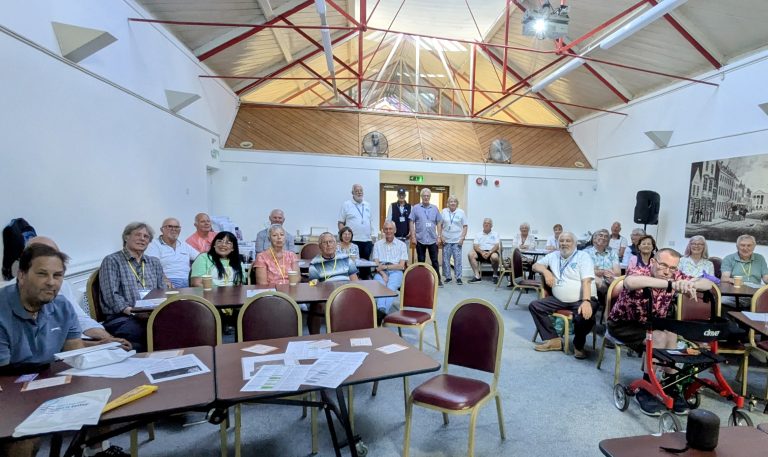Survey results released today have revealed that more than half of sons, daughters or fathers with prostate cancer, avoid talking about his diagnosis.1 Despite this, almost one in two sons and daughters surveyed admitted to having questions they wanted to ask their father, 1 and three out of five wish they felt more confident in starting a conversation with their father about his prostate cancer.1
The results come from a national survey carried out as part of the Manversation prostate cancer awareness campaign, and questioned 200 sons and daughters whose father is currently living with a prostate cancer diagnosis.
In response to the survey, a discussion guide has been developed to help sons and daughters have better conversations with their father about his prostate cancer. These conversations are vitally important, as noticing small changes in men with prostate cancer can make a big difference to their long-term survival, as it could mean the cancer is progressing to a more advanced stage.2,3,4
The guide, available at www.manversation.co.uk/support/ draws on the experiences of sons and daughters whose father has prostate cancer, to provide practical advice and guidance on how to start these conversations. The guide also contains easy to understand medical information about prostate cancer and the treatments available to enable more informed conversations, as the survey highlighted a distinct lack of knowledge about the symptoms of advanced prostate cancer.1 The discussion guide was produced for the Manversation prostate awareness campaign, which is supported by Tackle Prostate Cancer and Orchid Fighting Male Cancer, and is organised and funded by Bayer.
Ken Mastris, Tackle Chairman, said: “Prostate cancer affects the entire family and it can be frightening for everyone involved. But good communication can help support families in tackling it together.”
The study also revealed 57% of sons and daughters worry about their fathers’ condition several times a week.1However, many avoid the topic due to worrying their father will become upset, embarrassed or angry by the conversation.1
Ken says there is an unmet need for supporting young people and adults whose father has prostate cancer, sometimes years after the diagnosis. He added: “Some fathers may not be aware of the impact that their condition has on their children’s lives, particularly the psychological and emotional aspects. Family life may feel strained and when children are unable to talk openly to their father it can lead to feelings of stress, sadness and frustration” Ken said.
Findings from the Manversation survey revealed that: 1
- Over half (54%) of sons and daughters say that the topic of prostate cancer is one that is avoided by either them, their father or both of them
- More than three fifths (61%) of sons and daughters wish they felt more confident in starting a conversation with their father about his prostate cancer.
- Almost one in three (31%) have never tried to start a conversation with their father about his prostate cancer
- Worrying that they will upset their father and make things harder for him is the main barrier to having a conversation, followed by feeling awkward, a lack of confidence in talking about the topic and feeling anxious
- One in three (33%) do not feel satisfied with the conversations they have with their father about his prostate cancer
- Almost half (48%) have questions they would like to discuss with their father about his prostate cancer but don’t currently feel able to do so
Prostate cancer is the most common cancer in men in the UK, affecting one in eight men over their lifetime,5and one in four black men.6 While most prostate cancers grow slowly or not at all, in some cases it can spread to other parts of the body and become advanced.5
The survey showed that over three quarters (84%) of sons and daughters say they feel confident in recognising the signs and symptoms of advanced prostate cancer.1 However, just 1% (2 people) recognised all of the correct signs and symptoms of advanced prostate cancer (from the list that was shown in the online survey).1
Simon Greenstreet, Head of Communications, Bayer, says it is important that families are educated on advanced prostate cancer symptoms so they know the signs to look out for, and are able to act quickly.
“Family and close friends are often well-placed to help spot changes in a loved one’s symptoms. It is important to address conversation barriers so that they can support and encourage their father to visit their doctor as soon as they experience any potential symptoms” Simon said.
“We hope that by providing real-world insight-based support and practical advice, we can help motivate and equip men and their families with the tools to have these difficult conversations,” Simon added.
References
- Market research with 200 sons and daughters, aged 18-45 years old, of a father currently living with prostate cancer, conducted by 3GEM Research and Insights in May 2019 on behalf of Pegasus and Bayer.
- Prostate Cancer UK. Advanced prostate cancer: Managing symptoms. Available at: https://prostatecanceruk.org/prostate-information/advanced-prostate-cancer/advanced-prostate-cancer-managing-symptoms [Last accessed October 2019]
- NHS. Treatment Prostate cancer. Available at: https://www.nhs.uk/conditions/prostate-cancer/treatment/[Last accessed October 2019]
- Prostate Cancer UK. What are the symptoms of prostate cancer? Available at: https://prostatecanceruk.org/prostate-information/about-prostate-cancer/prostate-cancer-symptoms [Last accessed October 2019]
- Prostate Cancer UK. Prostate cancer – A guide for men who’ve just been diagnosed. Available at: https://prostatecanceruk.org/media/2494162/prostate-cancer-a-guide-for-men-whove-just-been-diagnosed-in-large-print_ifm.pdf [Last accessed October 2019]
- Prostate Cancer UK. Are you at risk? Available at: https://prostatecanceruk.org/prostate-information/are-you-at-risk [Last accessed October 2019]



